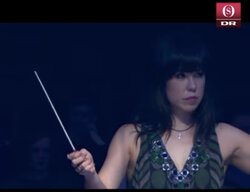slowmotion
Quite dreadful
- Location
- lost somewhere
I think that the general idea is that the conductor interprets the piece written on the pages of the musical score by the composer. The composer doesn't have a band or have a unique recording, like (say) Brown Sugar or God Save The Queen, he just hands over notes on a page. The conductors convert that to music from their orchestras as they see fit, and the results can be vastly different. Take Beethoven's Third Symphony. Karajan and the Berlin Philharmonic's recordings are (in my VHO) ghastly compared to Bohm's with the Vienna Philharmonic.
I shall return to my plinth on Pseud's Corner.....
I shall return to my plinth on Pseud's Corner.....


 :
:
 ... I'm sure there was one piece mentioned that gradually speeds up and if the conductor gets it wrong, it would be in danger of being far too fast at the climax. I can't even remember what the series was called, it's on the tip of my tongue
... I'm sure there was one piece mentioned that gradually speeds up and if the conductor gets it wrong, it would be in danger of being far too fast at the climax. I can't even remember what the series was called, it's on the tip of my tongue